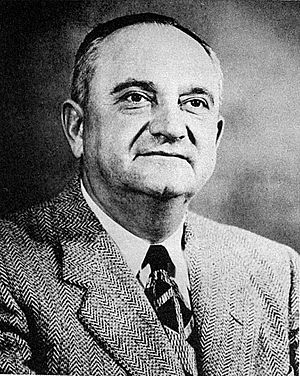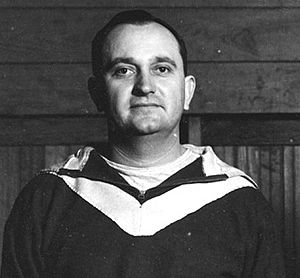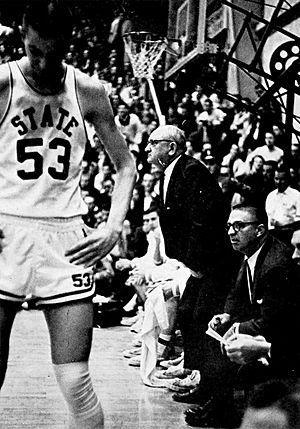Adolph Rupp facts for kids

Rupp in 1954
|
|
| Biographical details | |
|---|---|
| Born | September 2, 1901 Halstead, Kansas, U.S. |
| Died | December 10, 1977 (aged 76) Lexington, Kentucky, U.S. |
| Playing career | |
| 1920–1923 | Kansas |
| Coaching career (HC unless noted) | |
| 1926–1930 | Freeport HS |
| 1930–1972 | Kentucky |
| Head coaching record | |
| Overall | 876–190 (college) |
| Accomplishments and honors | |
| Championships | |
| As a coach 4× NCAA Division I tournament (1948, 1949, 1951, 1958) 6× NCAA Regional – Final Four (1942, 1948, 1949, 1951, 1958, 1966) 27× SEC regular season (1933, 1935, 1937, 1939, 1940, 1942, 1944–1952, 1954, 1955, 1957, 1958, 1962, 1964, 1966, 1968–1972) 13× SEC tournament (1933, 1937, 1939, 1940, 1942, 1944–1950, 1952) SoCon regular season (1932) As a player 2× Helms National (1922, 1923) |
|
| Awards | |
| 5× National Coach of the Year (1950, 1954, 1959, 1966, 1970) 7× SEC Coach of the Year (1964, 1966, 1968–1972) |
|
| Basketball Hall of Fame Inducted in 1969 |
|
| College Basketball Hall of Fame Inducted in 2006 |
|
Adolph Frederick Rupp (born September 2, 1901 – died December 10, 1977) was a famous American college basketball coach. He is known for winning 876 games during his 41 years of coaching at the University of Kentucky. This makes him one of the top coaches in college basketball history.
Rupp is also second among all men's college coaches for his amazing winning percentage of .822. This means his teams won 82.2% of their games! He was honored for his achievements by being added to the Naismith Memorial Basketball Hall of Fame in 1969.
Contents
Adolph Rupp's Early Life
Adolph Rupp was born on September 2, 1901, in Halstead, Kansas. His parents, Heinrich and Anna, were immigrants from Germany. Adolph was the fourth of six children. He grew up on a large 163-acre farm.
Rupp started playing basketball when he was very young. His mother even made him a ball by stuffing rags into a sack! He later remembered, "Mother sewed it up and somehow made it round. You couldn't dribble it. You couldn't bounce it either."
He became a star player for the Halstead High School basketball team. This was one of the first teams in the area to use a real basketball. He scored about 19 points per game. His teammates often said that Rupp was like an unofficial coach for the team.
After high school, Rupp went to the University of Kansas from 1919 to 1923. He worked part-time to help pay for college. He was a reserve player on the basketball team under the famous coach Phog Allen. He also got to know James Naismith, who invented basketball, during his time there.
During Rupp's junior and senior years, the Kansas basketball teams were excellent. These teams were later recognized as the best in the nation. Rupp also earned a master's degree from Teachers College, Columbia University.
Coaching in High School
Rupp started his coaching career at Burr Oak High School in Kansas. After one year, he moved to Marshalltown, Iowa. There, he coached wrestling, even though he had to learn the sport from a book! He led the Marshalltown team to a state wrestling title in 1926.
From 1926 to 1930, Rupp became the head basketball coach at Freeport High School in Illinois. He also taught history and economics. At Freeport, Rupp's teams won 66 games and lost 21. In 1929, his team finished third in the state tournament. While at Freeport, Rupp coached William "Mose" Mosely, who was the first African-American to play basketball at Freeport.
The head basketball coach from the University of Illinois, Craig Ruby, spoke at Freeport's team banquet in 1930. Ruby told Rupp about the head coaching job opening at Kentucky and recommended him for it. While in Freeport, Rupp also met his future wife, Esther Schmidt.
Coaching at the University of Kentucky
Rupp coached the University of Kentucky men's basketball team for 41 seasons, from 1930 to 1972. During this time, he earned nicknames like "Baron of the Bluegrass" and "The Man in the Brown Suit."
Rupp's Kentucky teams won four NCAA championships (in 1948, 1949, 1951, and 1958). They also won one National Invitation Tournament title in 1946. His teams made it to the NCAA tournament 20 times and reached the Final Four six times. They also won 27 regular season titles in the Southeastern Conference (SEC) and 13 SEC tournaments.
Kentucky teams under Rupp were ranked #1 in the country many times. His 1966 team, called "Rupp's Runts," finished as runner-up in the NCAA tournament.
During his 41 years at Kentucky, Rupp coached many talented players. He had 32 players chosen as All-Americans and 44 players picked in the NBA Draft. Seven of his players won Olympic Gold Medals. He also coached two National Players-of-the-Year.
Rupp won the National Coach-of-the-Year award five times and the Conference Coach-of-the-Year award seven times. He was inducted into many Halls of Fame, including the Naismith Memorial Basketball Hall of Fame.
Since 1972, the Adolph Rupp Trophy has been given to the best men's college basketball player each year. The University of Kentucky also honored him by naming their 23,500-seat arena after him, Rupp Arena, which opened in 1976.
Rupp had to retire in March 1972 when he was 70 years old. This was the required retirement age for all University of Kentucky employees at the time.
The Famous 1966 Championship Game
A very important game in Rupp's career was the 1966 NCAA championship game. Kentucky played against Texas Western, coached by Don Haskins.
Kentucky's team was all white, while Texas Western's starting five players were all black. This game happened during the Civil Rights Movement, a time of big changes in America. Texas Western won the game 72–65. This game helped speed up the process of including more black players in college basketball teams across the country.
Rupp's Coaching Style
Rupp was a smart coach who came up with new ideas for basketball. He was one of the first to use the "fast break" and specific set plays. His offense had many planned plays with lots of movement and screens. He also developed early basketball moves like the "guard around" play.
For most of his career, he liked a tight man-to-man defense. But later, he started trying out a trapping zone defense. Rupp mostly recruited players from Kentucky and the surrounding region. More than 80% of his players were from Kentucky.
Rupp believed that players needed to master the basic skills of basketball. He stressed discipline and believed that practice and repetition were key to success. He was very demanding of his players and pushed them hard to be their best.
Rupp's Superstitions
Adolph Rupp was a very superstitious person. He often carried a "lucky" buckeye in his pocket. He also thought it was good luck to find a pin, especially a bobby pin, on a game day.
A funny story shows how superstitious he was: When he coached at Freeport, he bought a new blue suit to replace his old brown one. He wore the new blue suit to a game, and his team lost badly. After that, Rupp never wore anything but a brown suit to games again!
Working Towards Inclusion
Rupp made efforts to recruit African-American players. In 1960, he hired assistant coach Neil Reed to help with this. He even asked the UK president if the team could leave the SEC conference so he could recruit black players more easily.
Rupp tried to sign talented black players like Wes Unseld and Butch Beard in 1964, but they both chose to play for Louisville. Rupp eventually signed his first black player, 7'2" center Tom Payne, who played in the 1971 season.
After Coaching Kentucky
After retiring from Kentucky, Rupp became the Team President of the Memphis Pros (later called the Memphis Tams) in the American Basketball Association (ABA) in April 1972.
In June 1973, Rupp left the Tams, saying the ABA was not serious enough. A few months later, he became the Vice President of the Board for the Kentucky Colonels, another team in the ABA.
His Final Years
Adolph Rupp passed away from spinal cancer at age 76 on December 10, 1977. He died in Lexington, Kentucky. It was a special night because his former team, Kentucky, was playing against his old college team, Kansas. The game was even promoted as "Adolph Rupp Night." He is buried in Lexington Cemetery. The Rupp Arena, where the Kentucky men's basketball team plays, is named in his honor.
See also
 In Spanish: Adolph Rupp para niños
In Spanish: Adolph Rupp para niños
- List of college men's basketball coaches with 600 wins
- List of NCAA Division I Men's Final Four appearances by coach
 | Jewel Prestage |
 | Ella Baker |
 | Fannie Lou Hamer |



